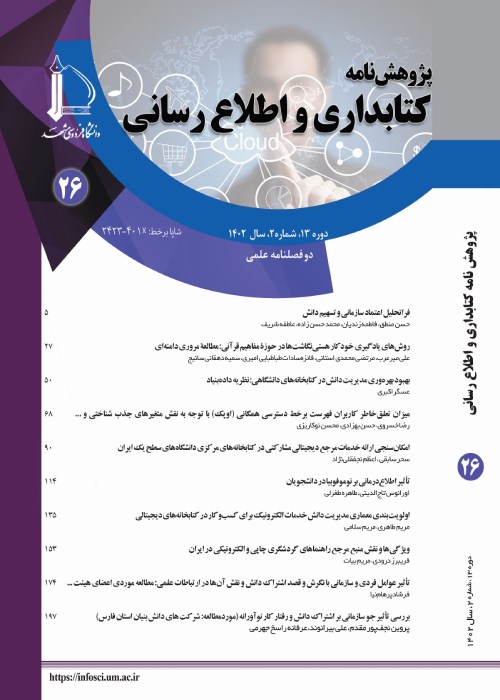Feasibility Study of Collaborative Digital Reference Services in the Central Libraries of Level One Universities in Iran
Collaborative digital reference services are one of the suitable services in libraries where two or more libraries act in a cooperative or group manner to provide reference services using one of the forms of digital reference services. In this type of service, the user sends a request to a library that is a member of the library network. The library receiving the question will do this if it is able to provide an answer; otherwise, it presents the question to another library that is a member of this network and has the ability to answer this question. The current study was conducted to study the feasibility of Collaborative Digital Reference Services in Iran’s top university central libraries. Several researches have been conducted inside and outside the country in connection with the topic of the current research. Reviewing the researches shows the fact that creating a collaborative digital reference service is necessary for universities and large centers. In Iranian researches, feasibility in terms of human resources, equipment and budget of digital reference services in libraries has been emphasized. In foreign researches, the review of collaborative digital reference services in terms of structure, patterns, software, hardware, features and services and human resources, evaluation and satisfaction of these services in libraries has been considered. Among the researches carried out inside the country, no research has investigated the possibilities and conditions of creating a collaborative digital reference in the central libraries of top level universities in Iran. Regarding the development of collaborative digital reference services in the world and the role of universities in meeting the educational and research information needs of users, as the most important knowledge production and dissemination centers in Iran have not yet turned to these services at the highest level.
In terms of purpose, this research is applied research and in terms of nature, this research is descriptive survey. The population of the study was composed of managers (13 managers from 13 central libraries) and reference librarians (42 librarians from 13 central libraries) from Iran’s top university central libraries (13 libraries). Two researcher-made questionnaires were used to collect data from mangers and librarians. In order to assess the validity, the questionnaires were sent to 9 Library and Information Science professors, KMO test was another method which was used for measuring the validity of the questioners, which indicated 0.93 for managers’ questionnaire and 0.90 for the librarians. So, the two questionnaires were determined to be valid. To estimate the reliability, Cronbach’s Alpha was calculated which showed 0.76 for managers’ questionnaire and 0.79 for that of the librarians. SPSS was used for the analysis of the collected data.
The overall average obtained for the level of familiarity of the librarians of the studied libraries with the skills needed to provide digital reference services in general is 3.53, which is higher than the average of 3.00. However, in the skill of "familiarity with network hardware issues and problems", the situation was reported to be slightly lower than average, and librarians' skills are needed to be supported or improved in this field. Findings also showed the libraries do not have some of the required software and hardware facilities to provide the digital reference service. Only 23.08% of libraries (libraries of Shahid Beheshti University, Allameh Tabatabai University and Ferdowsi University of Mashhad) use independent software for the question and answer with the user. The existence of independent digital reference software in only 3 central libraries (out of 13 top academic libraries) seems far from expected. The electronic information resources coverage was acceptable. The analysis shows that Iran’s top university central libraries face with some problems in terms of their funding, but these problems are not significant.
If the central libraries intend to provide collaborative digital reference services, the conditions and equipment are available to some extent, and perhaps with careful coordination and planning and using unified and integrated software, they can establish fixed and specific platforms for providing remote services. In the studied libraries, due to the available facilities and tools, it may be possible to turn face-to-face interactions in libraries into effective remote interactions with the same quality as face-to-face interactions, especially during crises and when libraries are closed. Before taking action, due to the lack of coherent digital reference services in the studied libraries, it is necessary to form a specialized group and committee consisting of experts under the supervision of expert librarians and the cooperation of computer experts to provide cooperative digital reference services. Also, due to the lack of specific software in some of the studied libraries, it is better to budget and prepare a single software to provide collaborative reference services. In the next step, due to the lack of equipment and hardware facilities in the studied libraries, it is better to identify and prepare the necessary equipment and hardware facilities to provide these services. It should be noted that providing such new services requires a series of joint trainings; It is suggested that training courses be held for reference librarians in order to increase their level of knowledge and efficiency in the field of providing collaborative digital reference services by libraries. Advertising, promotion and marketing of services is more important than setting up the service itself. It is important to use advertising plans and programs to familiarize the users of universities in this field and it will make them know more about this service.
- حق عضویت دریافتی صرف حمایت از نشریات عضو و نگهداری، تکمیل و توسعه مگیران میشود.
- پرداخت حق اشتراک و دانلود مقالات اجازه بازنشر آن در سایر رسانههای چاپی و دیجیتال را به کاربر نمیدهد.



